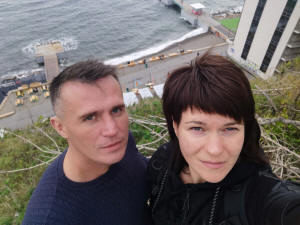Russian teacher rejected Kremlin propaganda, then paid the price
 Send a link to a friend
Send a link to a friend
 [April 18, 2022]
LONDON (Reuters) - Days after
Russia’s Feb. 24 invasion of Ukraine, Andrei Shestakov opened a set of
files in a WhatsApp group chat for history teachers like himself in his
town in east Russia. [April 18, 2022]
LONDON (Reuters) - Days after
Russia’s Feb. 24 invasion of Ukraine, Andrei Shestakov opened a set of
files in a WhatsApp group chat for history teachers like himself in his
town in east Russia.
The files - which Reuters reviewed and contain dozens of pages of
documents and presentations as well as video links - are instructions on
how to teach teenage school children about the conflict. It’s unclear
who shared the files to the group chat, but many of the documents carry
the crest of the education ministry in Moscow.
The material includes lesson guides stating that Russian soldiers
fighting in Ukraine were heroes, that Ukraine's rulers made common cause
with people who collaborated with World War Two Nazis, that the West was
trying to spread discord in Russian society, and that Russians must
stick together.
Shestakov said he leafed through the files during one of his lessons.
The slim-built 38-year-old said that before becoming a teacher in
January he had spent 16 years as a police officer. But he had growing
doubts in recent years, he said, about whether Russia's rulers were
living up to the values they professed about democracy, influenced in
part by prominent Kremlin critic Alexei Navalny.
He decided not to teach the modules to his pupils at the Gymnasium No. 2
school where he worked in Neryungri, a coal-mining town in eastern
Siberia, some 6,700 km (4160 miles) east of Moscow.

Instead, Shestakov told his pupils about the contents of the teaching
guide and why they were historically inaccurate, he told Reuters. For
instance, he said he explained that the materials claimed Ukraine was an
invention of Bolshevik communist Russia yet history textbooks discussed
Ukrainian history going back centuries.
He went further. On March 1, he told pupils during a civics class he
would not advise them to serve in the Russian army, that he opposed the
war against Ukraine, and that Russia's leaders exhibited elements of
fascism even while saying they were fighting fascism in Ukraine,
according to a signed statement taken by police and reviewed by Reuters.
In the following days, the local police and the Federal Security
Service, known as the FSB, summoned Shestakov for questioning, according
to the March 5 signed statement about his classroom comments. He said he
has not been charged in relation to those comments. The FSB and local
police didn’t respond to requests for comment.
A court did fine him 35,000 roubles (about $420) on March 18 for
discrediting the Russian armed forces after he re-posted videos online
of interviews with Russian soldiers captured in Ukraine, according to a
court ruling seen by Reuters.
He said he quit his job last month because he believed he would be fired
anyway for his public opposition to the war, he told Reuters. The local
education authority and the education ministry didn’t respond to
requests for comment on Shestakov and the teaching guide. When Reuters
reached the school by phone, a woman who identified herself as acting
head teacher said she declined to comment on Shestakov’s case and ended
the call.

Teachers across Russia have received the same or similar teaching
guides, according to two teacher's union officials, two other teachers
and social media posts from two schools reporting they had taught the
modules.
Olga Miryasova, an official with a trade union called Teacher, said
regional education authorities circulated the teaching guide Shestakov
received to multiple schools around the country. Reuters was unable to
determine independently how many schools received the modules. One of
the teachers said they received a different teaching pack from the one
Shestakov did, though it contained similar content.
The initiative shows how the Russian state -- which has been
intensifying its grip on the mainstream media -- is now extending its
propaganda effort about the Ukraine war into schools as the Kremlin
seeks to shore up support. Since the war started, many Russian schools
have posted images on social media showing pupils sending messages of
support to troops fighting in Ukraine and standing in formation to spell
out the letter "Z," a symbol of support for the war in Russia.
Teachers who disagree with the war are now joining the ranks of
opposition activists, non-governmental organisation campaigners, and
independent journalists in feeling the pressure of the Russian state,
with fines, prosecutions, and the prospect of forfeiting their jobs.
President Vladimir Putin in early March signed into law legislation that
makes the spread of “fake” information about the Russian armed forces,
an offence punishable with fines or jail terms of up to 15 years.
Even before the invasion, the Kremlin had been tightening the screws on
its opponents using a combination of arrests, internet censorship and
blacklists.
The Kremlin didn’t respond to requests for comment about its handling of
opposition to the war, the teaching guide and Shestakov's case.

Russia’s Education Minister Sergei Kravtsov told a parliamentary
committee in March that his ministry had launched a nationwide drive to
discuss Russian-Ukrainian relations with pupils, amid questions from
children about the situation in Ukraine and sanctions.
The Kremlin has said it is enforcing laws to thwart extremism and
threats to stability. It says it is conducting what it calls a "special
operation" to destroy its southern neighbour’s military capabilities and
"denazify" Ukraine and prevent genocide against Russian speakers,
especially in the east of the country. Kyiv and its Western allies have
dismissed this as a baseless pretext for war, and accuse Russian forces
of killing civilians.
WEST’S ‘HYBRID WARFARE’
The teaching guide that Shestakov received says it is aimed at pupils
aged between 14 and 18 years. It comprises detailed lesson plans for
teachers, links to videos of speeches by President Putin and short films
to illustrate the lessons.
[to top of second column]
|

Andrei Shestakov, a history teacher and former police officer from
eastern Russia who was prosecuted after expressing in public his
opposition to Russia's war in Ukraine, poses with his partner in
this undated handout picture. Andrei Shestakov/Handout via REUTERS
 According to the teaching materials,
the West is waging information warfare to try to turn public opinion
against Russia’s rulers, and that all Russian people need to stand
firm against that.
One lesson plan explains Russia was fighting a cultural war against
the West which had destroyed "the institute of the traditional
family" and was now trying to foist its values on Russia.
It says that since the collapse of the Soviet Union, Ukraine had
conducted an anti-Russian policy. "There were attacks on the Russian
language, our common history was falsified, war criminals and
criminal groups from World War Two were turned into heroes,"
according to the document, which refers to Ukrainian nationalists
who made an alliance with Germany during that war.
Another lesson says that the West is deploying "hybrid warfare" -- a
mixture of propaganda, economic sanctions, and military pressure --
to try to defeat Russia by fomenting internal conflict. “That is
precisely why they urge us to attend unsanctioned demonstrations,
they incite us to break the law, and try to scare us," it reads.
"We must not succumb to provocation," the document says.
The modules include a game where pupils have 15 seconds to decide if
a statement is true or false. One statement reads: "The organisation
of protests, provocations of the authorities and mass gatherings are
an effective way of resolving a hybrid conflict." According to the
lesson guide, the correct answer is "false."
Reuters found social media posts from a school in Samara, on the
Volga river, and a school in Minusinsk, southern Siberia, showing
slides from the same presentations being used.

Danil Plotnikov, a math teacher in Chelyabinsk, the Ural mountains,
told Reuters he had been asked by his bosses to teach similar
content but from a different teaching pack than the one Shestakov
received; Plotnikov didn’t identify who the bosses were. Tatyana
Chernenko, a math teacher in Moscow, said colleagues in other
schools told her they had been asked to teach similar modules but
they had not been taught in her school.
The teachers Reuters spoke to said that some regions and schools
pushed the lessons harder than others. None of the five teachers
said they had heard of cases where teachers were explicitly ordered
to teach the modules. They said it was usually framed as a request,
or a recommendation by a school or regional education authorities.
Some had said no, and faced no consequence, said Daniil Ken, chair
of an independent teachers' trade union called Teachers' Alliance.
Others did not teach the lessons but told bosses they had, said Ken.
He added refusing was a risk, with teachers not knowing if their
head teachers would pressure them to quit.
Ken said his union has heard from about half a dozen teachers a week
who say they are quitting because they didn’t want to promote the
Kremlin's line - something Reuters wasn’t able to independently
verify.
POLITICAL AWAKENING
Shestakov wears his hair close cropped and practices sambo, a
martial art developed in the Soviet army. He said his career in the
police included a one-year stint in the interior ministry special
forces, an arm of law enforcement whose officers are now fighting in
Ukraine. The interior ministry didn’t respond to a request for
comment.
By 2018, when he was a community officer working with juvenile
offenders, he had a political awakening, according to Shestakov. He
said he started watching videos put out by Navalny, the opposition
figure who is now in a Russian jail, alleging corruption by Kremlin
leaders.

"I became a real opposition person," Shestakov said.
He said when the war in Ukraine started, the images of casualties
disturbed him and he spent hours watching videos of the fighting on
social media.
Under a pseudonym, he re-posted the videos of interviews with
Russian soldiers captured in Ukraine to the comments section of a
local media outlet that has about 5,200 subscribers, according to
Shestakov and the March 18 court ruling seen by Reuters.
The court said his actions were a violation of a law forbidding the
discrediting of the Russian armed forces.
Shestakov said he suspects the FSB has in recent weeks been
eavesdropping on his phone conversations, though he did not have
evidence of that. He also said that he has seen people he recognises
as undercover FSB officers three times in recent days. The FSB
didn’t respond to requests for comment on whether it is monitoring
him.
Now, Shestakov plans to leave Russia because he says he fears
further penalties from authorities. He would join tens of thousands
of Kremlin opponents who have also fled the country since Putin
began cracking down hard on opposition in 2018.
He said he planned to go to Turkey, unless the authorities bar him
from leaving the country.
Staying and dropping his public opposition to the war was not an
option for him, Shestakov said. "It will be hard for me to keep my
mouth shut," he said.
(Editing by Christian Lowe and Cassell Bryan-Low)
[© 2022 Thomson Reuters. All rights
reserved.] This material may not be published,
broadcast, rewritten or redistributed.
Thompson Reuters is solely responsible for this content.
 |